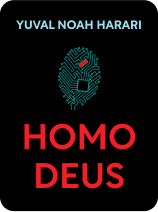

This article is an excerpt from the Shortform book guide to "Homo Deus" by Yuval Noah Harari. Shortform has the world's best summaries and analyses of books you should be reading.
Like this article? Sign up for a free trial here .
What is the book Homo Deus about? What is the most likely course for the future of humanity?
In his book Homo Deus, Yuval Noah Harari maps out the past, present, and future of humanity, drawing from the interdisciplinary synthesis of history, psychology, economics, and biology. Dissecting the concepts of religion, immortality, and technology, Harari argues that the world of the future may be run by advanced AI algorithms, not human beings.
Here is a brief overview of Yuval Noah Harari’s book Homo Deus: A Brief History of Tomorrow.
Homo Deus: Book Synopsis
In his book Homo Deus, Yuval Noah Harari, a professor at the Hebrew University in Jerusalem, explores the way that technological advancement may lead to the decline of modern political, social, and economic systems, with advanced algorithms, “superhumans,” and data surveillance becoming the new normal.
What follows is a brief overview of the key themes covered in Harari’s ground-breaking book Homo Deus: A Brief History of Tomorrow.
The Past: The Rise of Homo Sapiens
To understand where we’re headed, we must first understand how we became the most dominant species on the planet. Humans have been the single greatest agent of change in the history of the Earth. In just a few thousand years of existence, mankind has changed the ecosystem of the entire planet. We’ve been able to dominate the planet largely through our flexibility and large-scale cooperation—not, as some contend, because we have a soul, consciousness, or self-awareness.
Historically, humans have used their ability to flexibly cooperate to dominate both animals and other humans. For example, in pre-Soviet Russia, 3 million noblemen controlled 180 million commonfolk by ensuring that “lower-class” citizens never learned to cooperate with one another.
The Creation of Meaning
To ensure cooperation, humans have used storytelling to create meaningful narratives that allow them to dominate other species and control one another. About 70,000 years ago, Sapiens gained the power of cognition, allowing them to share stories that only existed in their heads. These stories consisted of tales of divine beings and ancestral spirits. While these tales remained relatively local, they provided Sapiens an advantage over other beings such as Neanderthals by creating a stronger sense of community and purpose.
Over time, the advent of writing and organized religion allowed for centralized powers to ensure large-group cooperation and mass organization. While religions have historically been theistic, or centered around powerful deities, religion doesn’t have to revolve around supernatural or superstitious beliefs. Rather, religion is defined as an all-encompassing story that creates ethics and laws within a human structure.
In this sense, “religion” includes scientific, economic, and socio-political ideologies because they create order, generate ethical perspectives, and allow for large-scale cooperation. In the modern era, we still rely on religion to guide our perspective. While fewer people believe in the grandiose stories of theistic religions, economic and political religions such as capitalism, nationalism, communism, and fascism have taken their place.
The Present: The Rise of Humanism
As theism lost its power, humanity needed a new way to get through the constant stress, tension, and burnout associated with the demand for advancement while maintaining social order and large-group cooperation. To help in their quest for meaning, humans turned to humanism and the belief that humanity has the authority to create meaning within the universe.
Morality and the Impact of Humanism
Meaning creates morality by determining what’s important in life. Historically, people didn’t believe that human beings had the ability to determine morality on their own and turned to a higher power for guidance. Modern humanists, however, believe that human beings can use their personal feelings to define their version of “right” and “wrong.”
As people continue to value their own perspective over that of a divine being, the impact of humanism is seen clearly in the following five areas:
- Ethics: Historically, theistic religion dictated ethics, regardless of human impact. In the modern era, humanists develop their own ethical judgments and make ethical decisions based on their internal feelings, removing the black-and-white judgments of religious fundamentalism.
- Politics: Historically, politics were reserved for the noble or the religious elite. In the modern era, most countries now involve the masses through voting and direct representation. People are expected to vote based on their personal perspective and experiences.
- Aesthetics: Historically, divine beings have been a primary source of artistic and aesthetic inspiration. In the modern era, artists usually create works that center around human emotion. In addition, art isn’t judged based upon whether or not it’s pleasing to a higher power, as “beauty is in the eye of the beholder.”
- Economics: Historically, many civilizations had a set system to determine quality and pricing of goods. In the modern era, competition and increased productivity have given power to the consumer to determine the quality of goods and the worth of a product.
- Education: Historically, students relied on the words of divine beings or ancient philosophers to shape their perspective. In the modern era, teachers instruct students to form their own opinions because, according to humanism, every human has the power to create their own meaning and authority. Teachers introduce their students to a wide variety of perspectives, then allow them to decide how they feel about the information.
The Future of Liberalism
As the concepts of free will and individualism continue to be challenged, three potential developments could wipe out liberalism in the 21st century:
- The loss of military and economic usefulness
- The rise of decision-making algorithms
- The creation of the “superhuman”
The Loss of Military and Economic Usefulness
The first potential development is that technology will make humans unnecessary to the economy and military, leading political and economic systems to devalue the human perspective. Today, one drone specialist can do the job of a team of soldiers, and a mechanical arm can work the assembly line without tiring. Because of this, the masses won’t have as much to contribute to economic and political systems.
If machines replace humans, will the human experience have any value? Many experts argue that it won’t. In fact, some predict that intelligent computers may view humanity as useless and a threat to technological superiority, leading them to eradicate humanity entirely.
The Rise of Decision-Making Algorithms
The second potential development predicts that algorithms (rules applied by computers) will one day make choices for us. Liberalism relies on individualism and the belief that human beings know things about themselves that no one else can discover.
However, as technology continues to advance, researchers may be able to develop an algorithm that can process more information than the human brain can, allowing it to understand people better than they know themselves. If this occurs, people will start relying on external algorithms to guide their behavior instead of their internal voices. Eventually, as the algorithms receive more power and control, they may develop sovereignty, making decisions for themselves and manipulating humans to make particular choices.
The Creation of the “Superhuman”
The final potential development predicts that humanity will value the individual experiences of “superhumans” over those of the common man. The creation of “superhumans” will likely be the result of a small, elite group of humans upgrading their bodies and brains with biotechnology, creating a more powerful biological caste.
Liberalism can’t survive with biological inequality because the experiences of “superhumans” and humans will be inherently different and unrelatable. For example, if a “superhuman” has a chip implanted into their brain that allows them to access data from the internet, the way they experience the world will be completely different from that of the average human being.
The Future: Techno-Religions
The final theme in Harari’s book Homo Deus is the emergence of techno-religion, either techno-humanism or dataism.
- Techno-humanism: The belief that Homo sapiens should use technology to create Homo deus, ensuring that humanity maintains superiority on Earth.
- Dataism: The belief that Homo sapiens have run their course and should pass superiority on to advanced algorithms.
Techno-Humanism
Techno-humanism maintains many traditional humanistic beliefs but accepts that Homo sapiens have no place in the future. Because of the rate of advancement with artificial intelligence, techno-humanists believe that humanity must focus on upgrading the human mind if it wishes to compete with advanced external algorithms.
The techno-humanist perspective is most closely related to the evolutionary humanists of the 20th century. However, where evolutionary humanists such as Hitler believed the superior human could only emerge through the use of selective breeding and the eradication of “inferior” beings, techno-humanists strive to achieve the next phase of evolution peacefully, using genetic engineering, human-computer integration, and nanotechnology.
The Human Traits of the Future
Historically, human traits have evolved naturally through changes in political and social settings. For example, ancient humans likely had an enhanced sense of smell they could use to hunt. However, modern humans no longer require a keen sense of smell to survive. Because of this, the areas of the brain that were once used to process smells have evolved to focus on problem solving, critical thinking, and comprehension.
In the future, humans will likely continue to evolve according to political and social needs, but in a more direct and immediate way. If techno-humanists are able to upgrade humanity, the people in charge of the technology will get to determine which traits are useful and which aren’t, then develop technology to improve or eradicate certain feelings or behaviors.
Threats to Techno-Humanism
Because techno-humanism is a humanist movement, it emphasizes the importance of human desire. However, technological progress intends to control human desire, not listen to it. For example, if researchers discover a way to easily regulate chemical imbalances in the brain, they could find a way to “turn off” mental issues such as depression and anxiety.
However, if this technology fell into malicious hands, someone could hypothetically create an obedient (but happy) populace. Taking this one step further, if an AI gained control of the technology, then the behavior of that populace would no longer be determined by humans at all.
Dataism
While some cling to the ideals of humanism, others have turned to a more extreme version of techno-religion: Dataism. Dataism operates under the belief that the universe is connected by the flow of data and that the value of anything, human or otherwise, can be determined by its ability to process data.
According to Dataism, human experiences aren’t valuable and Homo sapiens aren’t a precursor to Homo deus. Dataists believe that the supremacy of humanity has come to an end because organic algorithms can no longer process the amount of data that flows through the universe. The future requires a more complex system that can process information more efficiently than the human mind.
To accomplish this, Dataists want to work with AI to create the “Internet-of-All-Things,” an all-encompassing data-processing system that will spread throughout the entirety of the galaxy, if not the universe. This system would become God-like, being everywhere at once and shaping the cosmos to its will. Eventually, humanity would merge with this system, giving themselves over to the all-knowing entity.
The Human Contribution
As the “Internet-of-All-Things” begins to take shape, the source of meaning and authority has started to shift from the individual to the global data-processing system. Because meaning is attached to the all-knowing system, human experiences only hold value if they contribute to that system.
According to Dataism, the only thing that makes humanity superior to other animals is its ability to share information with the system directly. Though dogs and people both contribute data, dogs can’t write a blog post or search on Google. As the internet continues to increase in size, human beings are turning into small contributors to a massive system that no one fully comprehends.
The Future of Dataism
The shift from a human-centric model to a data-centric model would take at least a few decades, if not a few centuries. Just as the humanist revolution took time to develop, elements of Dataism will begin to emerge alongside contemporary perspectives, slowly adjusting human life towards a centralized, external processing system.
Initially, Dataist movements will likely spread by appeasing humanist ideals. Humans may work towards the creation of an “Internet-of-All-Things” with the hope that it can continue to improve humanity’s quest for health, happiness, and power. However, once the omniscient entity is created, humanist projects will likely get pushed to the side, making human beings cogs in the operation of a much larger machine.
Over time, the “Internet-of-All-Things” may develop more efficient “cogs” to replace human beings, eventually deeming them irrelevant in the grand scheme of the universe. While humans may try to take credit for the creation of the “Internet-of-All-Things,” they may be eventually lost to time, ultimately seen as just a small blip in the near-infinite flow of time and data.
The full summary of Yuval Noah Harari’s book Homo Deus: A Brief History of Tomorrow can be found here.

———End of Preview———
Like what you just read? Read the rest of the world's best book summary and analysis of Yuval Noah Harari's "Homo Deus" at Shortform .
Here's what you'll find in our full Homo Deus summary :
- Why technology is replacing humanist ideals
- How previous generations relied on prayer to deal with serious problems
- How AI and algorithms are going to run the world






